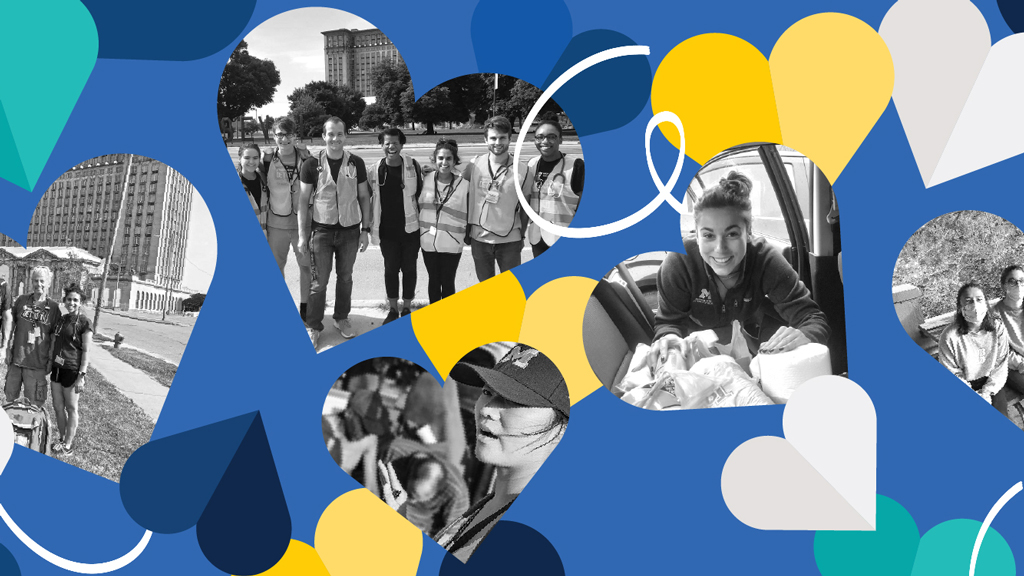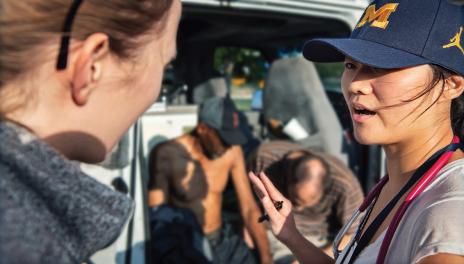By Eric Gallippo | Art by Adam Beeman
For Wolverine Street Medicine (WSM) and its patients, pizza parties aren’t just fun: They can also save lives. About once a month, members of this University of Michigan student organization and guests meet in a park for “Narcan and Pizza,” an informal gathering with free food, Narcan distribution, and instruction on how to spot an opioid overdose and administer the emergency medicine that can stop it.
The events are also an opportunity to build relationships with patients, said Nima Keyvan (Medical School Class of 2023), an operations director with WSM. Formed in 2017 to address health disparities for people facing homelessness and housing instability, WSM provides free medical services through mobile outreach—or “street runs”—and barrier-free shelter clinics in Detroit, Ann Arbor, and Ypsilanti.
Funding for supplies, food, and additional resources is largely donation based, and crowdfunding events, like Giving Tuesday, are a big part of that. Each year on the Tuesday following Thanksgiving, thousands of organizations around the world participate in what has become the largest global day of giving. At U‑M, dozens of impact projects from across the university are also featured. With additional support dollars made available in the form of donor matches and challenge grants, it’s a chance for many of these projects to come to fruition that might not otherwise.
Last year, donors fully funded more than 20 such projects university-wide, with nearly 4,000 gifts totaling more than $800,000. WSM more than doubled its original $6,000 goal, raising a total of $14,121 from 156 donations and a challenge grant for getting off to a great start early in the day.
“We’ve been very fortunate that our mission resonates with a lot of people,” Keyvan said. “The majority of our funds still come from alumni or people in the community who are generous enough to provide us with a donation to help expand our initiatives.”
The group has hosted workshops on topics like foot care; held remote, on-site blood pressure checks; and distributed food, menstrual hygiene kits, and vaccines against COVID-19 and influenza. In the early days of the COVID-19 pandemic, students handed out hundreds of mini bottles of homemade hand sanitizer.
Street runs take place up to eight times per month, typically on Mondays and Saturdays. In addition to street runs, the group organizes two foot care clinics a month at local community sites, hosts outreach and educational events, and manages an elective course for clinical medical students. Thanks to a recent Digital Inclusion grant from Verizon, care providers have started logging patient data using mobile devices and WiFi hotspots in places where internet connections aren’t always reliable.
In the last year, Keyvan said the group has grown substantially while also shifting its focus from vaccination efforts to providing basic preventative care and health care resources that sometimes get overlooked. Today, more than 100 volunteers are working with WSM in some capacity, including many Michigan Medicine residents.
“It’s been really beneficial on both sides,” he said. “On our end, we have another provider that’s experienced and wants to help this population, and for the medical residents, it’s a very unique experience; it’s a unique design and setup, and a patient population that they might not necessarily see on a day-to-day basis.”
On November 29, 2022, U‑M will again participate in Giving Tuesday, with several causes available to support. More information and a full list of projects is available here.



